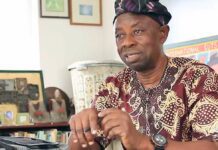Fela Kuti, a prominent Nigerian musician, used his saxophone to express a powerful message. However, the meaning behind his music was often lost on many listeners. Although many people have since referred to him as a prophet, Fela’s goal was simply to use sound to create awareness. His music was able to penetrate the future, for better or for worse.
Fela’s trumpet served as a conduit for his message, which was often difficult for people to understand. Nonetheless, his music contained a powerful message that he hoped would raise awareness of important issues. Although Fela had been called a prophet, it is important to note that he was not a religious figure (even though spiritual). Rather, he used his sound to create change and influence the course of history.
Today, Fela’s music is still revered for its power and impact. His use of sound to convey a message was ahead of its time, and his influence can still be felt in modern music. Fela’s music was not just a form of entertainment, but a call to action that demanded attention and action. In this way, Fela’s instruments served as a voice for change and a symbol of hope for a better future.

Fela’s song “M.O.P” is an allegory for the exploitation of Africa by colonial powers, and a call for Africans to reject the imposition of foreign values and embrace their own cultural heritage. The song underscores the power of music as a means of promoting awareness and inspiring social change, which was central to Fela’s philosophy and music.
In 1851, a British naval operation was conducted that resulted in significant destruction and casualties in Lagos, which became known as the “Reduction of Lagos.” The local drama between two prominent figures in Lagos’s history, Oba Kosoko and Akitoye majorly served as inspiration for Fela Anikulapo Kuti’s lyrical awakening sound in his song, M.O.P (Movement of the People).
Before delving into the review of the song “M.O.P,” let me provide some contextual history to better understand the inspirations behind this affluent song.
Following the abolition of the slave trade in the 19th century, Europeans needed to shift away from farming and abandon their reliance on forced labor in order to acquire labourers in their new colonies. This was an age of industrialization, where Europeans explored the African continent and beyond to search for raw materials to fuel their industries. They recognized that the slave trade needed to be abolished and looked to Africa for labourers. However, they encountered difficulties in their mission due to the African elites who were still profiting from the slave trade, with Nigerians even continuing to engage in the trade with the Portuguese, especially.
To overcome this obstacle, the imperialists employed various tactics, including using missionaries to disguise their true intentions and engaging in commercial businesses. While some African leaders who had the power to sell slaves were against the abolition, others who did not benefit from slavery aligned with the British imperialists to fight against the slave trade.
The British protectorate settled in Lagos state, which was one of the centers for the slave trade with the Portuguese. At that time, Kosoko was the King of Lagos and benefited from the slave trade. He reigned from 1845 until his deposition in 1851 when he refused to stop selling slaves. Despite being offered a friendly proposal to end the TransAtlantic Slave Trade, he rejected it.
Lagos was under the control of the Kingdom of Benin at that time, and it paid an annual tribute to Benin. However, Benin received a letter informing them that Kosoko was at war with England. Kosoko was able to defeat the British forces, but Consul Beecroft sent a letter to the Oba of Benin, alerting him to the situation.
In 1851, after Kosoko refused to abdicate the throne despite being given a month to do so, an attack was launched on his palace. This conflict became known as the ‘Ogun Ahoyaya’ or ‘Ogun Agidingbin’, named after the boiling of cannons.
Akitoye was indeed installed as the Oba of Lagos to replace Kosoko. He was known to have aligned himself with the British and the Saro, who were freed slaves in Lagos, but his actions were largely driven by self-interest.
In order to consolidate his power, Akitoye, through the British authority had his rival and the proteges sent into exile in Epe with the permission of the Awujale of Ijebu.
Kosoko, along with Oshodi Tapa, built his own cavalry and attempted to invade Lagos twice in 1853, but was repelled by British naval forces led by Commander Philips of HMS Polyphemus. Eventually, Kosoko signed a peaceful treaty with the British in 1854, which recognized Epe as a separate entity. This conflict led to the installation of a new monarch, Dosunmu, and Akitoye was ousted.

Kosoko was still interested in reclaiming the throne, but the King of Benin did not support his efforts. Lagos later became a colony, but Kosoko regained the throne after the annexation of Lagos state. Oshodi Tapa settled in Epetedo.
It is important to note that while Kosoko was involved in the slave trade, Akitoye was exploiting the trust of the British, and Dosunmu was not necessarily supportive of British rule. All three rulers represented the greedy African elites that were created by European influence.
The song, Movement of the People, commences by informing the populace of the deleterious effects of white supremacists on the brotherhood of Africa. Fela asserts that the whites referred to blacks as apes, as he stated, “Before dem turn us into monkey with tail o”. Through his music, Fela communicated news that was censored by the government and could not be disseminated by journals.
Colonialism had the unique characteristic of transmitting traditions to the leaders of the colony, thereby making the institution supreme and perpetual, even after attaining freedom. The ramifications of this phenomenon are still palpable in Nigeria today. The whites did not entirely depart because their institution still retains control. The government has become the masters, whereas the people who should be the sons are now servants, as highlighted in the lyrics, “dem no be father, we no be dem son. Dem be di master, we be di servant.” This attitude is not inherently African, but rather stems from the whites, “di government wey we get na overseas sense dem get.”
Fela’s song sheds light on the pervasive effects of colonialism on Nigeria, revealing the entrenchment of white supremacist ideology, which persists even after Nigeria gained independence.
Fela begins by introducing the story of two European ambassadors in black skin, whom he describes as embodying the “animal in human skin” as mentioned in another one of his songs. The song is an allegory for the exploitation of Africa by colonial powers, as represented by the ousting of Oba Kosoko from his throne by the whites.
The song can be interpreted as an endorsement of pan-Africanism or negritude, with Fela urging Africans to reject the imposition of foreign values and customs.
Fela’s music and philosophy were a reflection of his times, as he was deeply aware of the challenges facing Africa in the post-colonial era. Afrobeat, the genre he helped create, was built on the idea of using music as a means of raising awareness and promoting social change. Through his music and activism, Fela sought to inspire his fellow Africans to take pride in their heritage and resist the forces that sought to undermine their identity and autonomy.
In conclusion, “M.O.P” is a powerful song that explores the themes of imperialism, oppression, and cultural identity. Fela uses the narrative of the two European ambassadors in black skin to allegorize the exploitation of Africa by colonial powers, and the aftermath of the “bombardment of Lagos” serves as a symbol of the violence and destruction wrought by colonialism.
Through historical context, the song also critiques the intrusion of Western missionaries into African cultures, which has led to the misconception and distortion of traditional beliefs and practices.
Read Also:
 WHATSAPP: Click HERE to join the new Literature PADI WhatsApp group to receive latest updates on your phone and for further literary discussions!
WHATSAPP: Click HERE to join the new Literature PADI WhatsApp group to receive latest updates on your phone and for further literary discussions!










